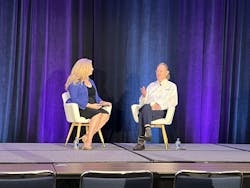CHARLOTTE, North Carolina—The economy has been a hot topic at industry conferences and trade shows this election year, and the McLeod User Conference here has been no different. Tom McLeod, president, CEO, and founder of McLeod Software, offered his insight during the conference’s keynote and breakout sessions.
Unlike other economic outlooks and predictions that often include statistical analysis, manufacturing and inventory trends, and a pinpointed timeframe when the trucking economy could begin its upturn, McLeod’s no-nonsense economic outlook is different.
“I got some good advice years ago that if you predict an event, don’t give a date,” McLeod told FleetOwner with a laugh. “And if you give a date, don’t predict an event.”
Instead, McLeod focused on the overall economy, why the trucking economy experiences excess capacity, and ways trucking companies can improve operations while waiting for the freight pendulum to swing in a positive direction.
While he admitted to having no “formal qualifications” for talking about the economy, McLeod said he’s been “an observer and participant” in the industry for nearly four decades. This experience has allowed him to see the trucking industry’s many cycles. Along with his own experience, McLeod said he also gathers insight from accountants and other knowledgeable individuals in the industry, such as economists from Freight Transportation Research and the American Trucking Associations, to form his opinions and predictions.
Flat vs. stable economy
Where economists, analysts, and other industry participants might categorize the industry’s current economy as “flat,” McLeod said the economy is more stable than flat.
“The great thing about the current forecast for the economy—and I'm mostly reporting what others have said—is for it to be very stable,” McLeod said during his keynote. “[The economy is] flat, but it's not down. We're not expecting a big recession. But it's solid, and really, it's been that way for a couple of years. That's been a good thing.”
McLeod used the illustration of a tidal wave compared to a ripple in a pool. The current economy experiences small changes, such as a slight drop in interest rates producing a 1% increase in housing manufacturing, much like the ripple effect of throwing a rock in a pool.
“But there’s no tidal wave,” McLeod said, referring to the absence of any market disruption that will drive a significant economic upturn within the industry.
What about the trucking recession?
While McLeod said a “big recession” wasn’t expected in the overall economy, he did acknowledge the recession in the trucking industry, and a rather long one at that—or at least when compared to the industry’s typical cycles.
McLeod explained a typical economic trucking cycle like this:
“When rates go up, trucking companies buy extra trucks, more people come into the industry, and we end up with too many trucks, and rates go to the floor,” McLeod said. “Then, trucks exit the market, rates rise up a little bit—boom—we don't have quite enough trucks. Rates go through the roof, and the cycle repeats.”
See also: Fleets Explained: How do freight rates work?
In a normal cycle, it would take about one year for this to “shake out,” McLeod said. The state of the trucking economy in 2018 and 2019 is a good example of this.
McLeod said that 2018 was a “fantastic year” for trucking, and from 2018 to 2019, freight movement increased by 2%, according to McLeod. However, the good conditions of 2018 caused trucking companies to purchase more trucks and employ more drivers. By 2019, the capacity—or the number of trucks on the road—exceeded the amount of freight that needed to be hauled. “That’s what makes rates go down,” McLeod explained.
As McLeod pointed out, the growth of private fleets is not helping the for-hire trucking sector improve more quickly, since private fleets now haul 75% of outbound shipments, up from a steady 67% in previous years.
“You take 8% of freight out of the for-hire market and put it on the private fleets, the for-hire market will really feel that,” McLeod said. “I believe that also has prolonged the Great Recession, keeping too many trucks on the road.”
See also: Private fleet benchmarking survey shows equipment trends, increase in driver retirement
But signs don’t point to doom and gloom in the industry forever. Later, McLeod told FleetOwner that there are signs the trucking economy is “firming up.” However, to see significant improvement in the trucking industry, “it’s purely a function of having the right number of trucks on the road.”
The approach that wins in the marketplace
When business is slow, McLeod said that’s the best time to analyze operations and seek different ways to earn business and gain market share. McLeod offered an example of one company that is doing just that.
He recently met with executives from a company that planned to grow its business during the current flat trucking economy. The plan was to simply gain market share by winning over customers from competitors through better service.
The company identified three niche markets as its target and believed that through developing its processes and service to “beat the other players,” it would gain market share.
“That’s the kind of approach that wins in the marketplace every time,” McLeod said in his keynote. “They said they’re in different niche markets. That’s certainly the definition of trucking. ... Many customers are very different, and developing your process to serve your customers better than the competition is your key to growing your business, even in the midst of a Great Recession that's been prolonged.”
See also: Clark: Fleets need to prioritize customer service to stay competitive
Part of trying to grow a business during an economic downturn also requires focus on improving internal processes, McLeod said later in a breakout session, because that sets “the stage for growth opportunities as they come along.” If a niche market opens or a competitor exits the market, companies that have improved their processes will be better prepared to grab that business.
Improving processes could look like improving operations both internally and externally, getting all staff on the same page with the same goals, and standardizing processes to deliver a consistent customer experience every time, McLeod said.
A key piece of advice McLeod gave at the end of his breakout session was just to learn to take risks, which can be scary in times like these with low rates.
“To move forward—and a lot of times in order to continue to survive—you’ve got to take a shot,” McLeod said. “You’ve got to pick where you think you can succeed … and go for it.”
About the Author
Jade Brasher
Senior Editor Jade Brasher has covered vocational trucking and fleets since 2018. A graduate of The University of Alabama with a degree in journalism, Jade enjoys telling stories about the people behind the wheel and the intricate processes of the ever-evolving trucking industry.


